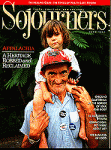Rarely a day goes by without a murder in the District of Columbia. In fact, there have been approximately six gun-related deaths a week since January 1, 1993--an alarming level of violence that many local citizens are no longer willing to accept.
Through a campaign called "A Community Cries Out," the Washington Black-Jewish Dialogue decided to turn their outrage into action. Each Thursday from March 18 through May 6, the dialogue--together with other groups, including Sojourners--organized noontime vigils in front of the National Rifle Association (NRA) headquarters. The vigils, which grew in size each week, were designed to raise awareness of the growing level of gun-related violence and to generate support for gun control legislation.
By targeting the NRA, the demonstrators joined a rapidly growing opposition to the powerful gun lobby, making clear they feel that the policies of the NRA are both destructive and irresponsible. "We are trying to create an opportunity for people all across the Washington area to stand up and call for an end to the suffering caused by the easy access to guns," said Rev. Albert Gallmon Jr., pastor of Washington's Mt. Carmel Baptist Church.
On one Thursday, the advocates were joined by the father of a 28-year-old woman who was recently killed in a random drive-by shooting. In an emotional testimony, the father shared both his grief and his frustration with the wide availability of firearms. And while he was thankful for the media coverage of his own tragedy, he asked that the same attention be given to the majority of D.C.'s homicide victims who are young, African-American men. "If we want peace in this town," he said, "we need to care about each and every life."
Facing Racism at Home
On Thursday evenings since early March, the citizens of and around Brevard, North Carolina, have gathered to study and discuss the effects of racism in their own small community. Through honest sharing and listening, participants in the dialogue, titled "Racism: Everybody's Problem," have begun to confront the hard truths about both institutionalized racism and their own hidden prejudices.
Organized as a response to the call for Spring Actions of Hope, the dialogue was designed to raise both awareness and understanding, and to lay the foundations for collective action. "We hope the power we create together will heal our brokenness and inequality in such specific areas as education, recreation, jobs, housing, health services, and in our places of worship," said organizers. Obviously many people felt the same, as the Bethel "A" Baptist Church hall was literally overflowing on the night of the first meeting. Since then, the number of participants has grown to 240, including the town's sheriff and mayor.
Each gathering begins with a group discussion of the evening's assigned readings from Sojourners' America's Original Sin: A Study Guide on White Racism, led by the gathering's coordinators, Rev. Frederick Gordon, pastor of the Bethel "A" Baptist Church, and Rev. J. Lynne Blankenship, minister of education at Brevard's First United Methodist Church. When appropriate, this time is also used to allow small group facilitators to share their own experiences and perspectives with the entire gathering.
Participants then break off into small groups of 15 to 20 people each, where they are able to explore the issues more thoroughly. Each small group is led by a team of two facilitators, one black and one white, and, according to a participant, this is where most of the sharing and growth occurs.
Before the nine-week series ends, organizers hope to determine how and in what form the participants want to continue the dialogue. "We know that the majority of us will leave this knowing each other better," Rev. Gordon told Sojourners, and because of it, the community is already more able to deal collectively with issues of racism. Most important, the dialogue has allowed many whites and people of color to find common ground from which to effect change.
The Daily Grind for Peace and Justice
If you are searching for an active way to support peace and economic justice in El Salvador, the answer may be as simple as the coffee you drink. Thanks to the joint efforts of Equal Exchange, Neighbor to Neighbor, and Oxfam America, North Americans now have the opportunity to purchase Cafe Salvador, a coffee produced by a coalition of Salvadoran cooperatives.
The cooperatives were formed by families who received land through the agrarian reform of 1980, before the program was derailed by right-wing violence. According to Equal Exchange, a worker-owned cooperative dedicated to establishing fair trade, one-fourth of Salvadoran coffee is now grown on such cooperatives, but their members do not share in the wealth of the coffee industry because they lack access to international markets. This access is essential to the campesinos' struggle to become both economically independent and free from the substandard working conditions and low wages characteristic of large coffee plantations.
By exporting directly to the United States, the co-ops avoid mid-level distributors, and workers are able to receive almost twice the price they would normally receive for their coffee. However, this makes Cafe Salvador somewhat more expensive for consumers than most supermarket coffees. Neighbor to Neighbor explains in their organizing guide that the price of Cafe Salvador is reflective of both its high quality and the fact that workers are receiving a more just compensation for their labor.
Brigitte Kerpsack was news assistant of Sojourners when this article appeared.

Got something to say about what you're reading? We value your feedback!
